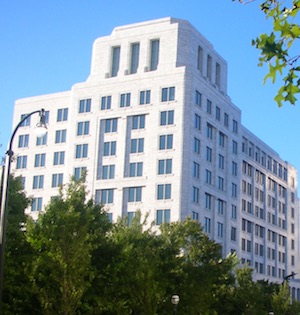“[S]ince the Reserve Banks hold patents in their names and they can be sued for patent infringement, ‘[i]t is only logical that the AIA authorized the Reserve Banks—like other persons and unlike the government—to petition for post-grant review.’” – Bank of Atlanta brief in opposition

Federal Reserve Bank of Atlanta, 1000 Peachtree St NE, Atlanta, GA.
On November 25, the Federal Reserve Bank of Atlanta (Bank of Atlanta) filed a brief in opposition in response to a petition for a writ of certiorari filed by Bozeman Financial LLC (Bozeman) with the U.S. Supreme Court on September 8. Bozeman’s petition followed a decision of the U.S. Court of Appeals for the Federal Circuit (CAFC), which affirmed a decision of the U.S. Patent and Trademark Office’s Patent Trial and Appeal Board (PTAB) holding that the PTAB correctly determined claims 21–24 of U.S. Patent No. 6,754,640 (’640 patent) and claims 1-20 of U.S. Patent 8,768,840 (’840 patent), both owned by Bozeman Financial LLC (Bozeman), to be directed to patent ineligible subject matter under 35 U.S.C. § 101. In reaching the decision, the CAFC first determined the appellees, all 12 of the United States Federal Reserve Banks, were considered “persons” under the America Invents Act (AIA) and, therefore, eligible to petition for post-issuance review under the AIA. In its brief in opposition, the Bank of Atlanta asserted that the CAFC “correctly concluded that the Reserve Banks should not be viewed as part of the sovereign for purposes of the AIA’s post-grant review provisions” and that the Supreme Court’s review is not warranted.
Proceedings Before the Federal Circuit
In reaching the decision that Reserve Banks were “persons” entitled to petition for post grant review, the CAFC relied on the Supreme Court’s holding in Return Mail, Inc. v. United States Postal Serv., which set forth that the Federal Government, including federal agencies, “is not a person who may petition for post-issuance review under the AIA.” The CAFC distinguished the Reserve Banks from the Postal Service, which was at issue in Return Mail. The CAFC considered that the Banks “do not receive congressional appropriated funds,” that “no Bank official is appointed by the President,” and that “Banks cannot promulgate regulations with the force of law” in reaching its conclusion that Banks were distinct from the government and, therefore, were “persons” under the AIA purposes of seeking post-grant review. Bozeman filed a petition for rehearing en banc, which the CAFC denied on June 3, 2020, and subsequently filed the petition for a writ of certiorari with the Supreme Court.
SCOTUS Petition
In its petition, Bozeman asked the Supreme Court to consider the question of whether the Federal Reserve Banks, i.e. the “operating arms” of the Federal Reserve System, are “distinct” from the Federal Government, and qualify as “persons” permitted to seek post-issuance patent review under the AIA. Bozeman asserted that the CAFC erred in concluding that the Banks were distinct from the government and thus persons under the AIA and Return Mail. Bozeman argued that the CAFC’s conclusion that Banks were “persons” was incorrect because the AIA is silent on the matter and the CAFC “filled [the] void by fashioning a formalistic test of its own creation which ignored numerous significant features of the Federal Reserve System.” Bozeman also noted that the Supreme Court’s review was warranted because the CAFC’s decision “conflicts with relevant decisions by several other courts of appeals” and noted that it presented “an important question of federal law that has not been, but should be, settled by [the Supreme] Court.”
Brief in Opposition
In its brief in opposition, the Bank of Atlanta asserted that the CAFC “properly considered the attributes of the Reserve Banks relevant to the question at hand—namely, the fact that the Banks’ participation in the patent system bears little resemblance to that of federal agencies.” In addition, the Bank of Atlanta noted that the CAFC’s decision did not merit the Supreme Court’s review because the question of how a Reserve Bank should be treated under a particular statue is specific to the text and context of each individual statute. Thus, the Reserve Banks may be treated differently under different statues and the question of whether Reserve Banks are “persons” under the AIA does not have broader implications under other statutes. The Bank of Atlanta also asserted that, since the Reserve Banks hold patents in their names and they can be sued for patent infringement, “[i]t is only logical that the AIA authorized the Reserve Banks—like other persons and unlike the government—to petition for post-grant review.” Thus, the Bank of Atlanta concluded by stating that the “Court’s review is not warranted.”

![[IPWatchdog Logo]](https://ipwatchdog.com/wp-content/themes/IPWatchdog%20-%202023/assets/images/temp/logo-small@2x.png)

![[[Advertisement]]](https://ipwatchdog.com/wp-content/uploads/2023/01/2021-Patent-Practice-on-Demand-1.png)
![[Advertisement]](https://ipwatchdog.com/wp-content/uploads/2024/04/UnitedLex-May-2-2024-sidebar-700x500-1.jpg)
![[Advertisement]](https://ipwatchdog.com/wp-content/uploads/2024/04/Artificial-Intelligence-2024-REPLAY-sidebar-700x500-corrected.jpg)
![[Advertisement]](https://ipwatchdog.com/wp-content/uploads/2024/04/Patent-Litigation-Masters-2024-sidebar-700x500-1.jpg)

![[Advertisement]](https://ipwatchdog.com/wp-content/uploads/2021/12/WEBINAR-336-x-280-px.png)
![[Advertisement]](https://ipwatchdog.com/wp-content/uploads/2021/12/2021-Patent-Practice-on-Demand-recorded-Feb-2021-336-x-280.jpg)
![[Advertisement]](https://ipwatchdog.com/wp-content/uploads/2021/12/Ad-4-The-Invent-Patent-System™.png)






Join the Discussion
2 comments so far.
ChrisW
December 3, 2020 01:43 pmI doubt they’ll grant Cert., this question has been answered already, hasn’t it ?
Pro Say
December 2, 2020 05:50 pmSo . . . yet another unforeseen / unintended consequence of the abominable, wretched, innovation-killing AIA.
This potential issue / conflict should have been foreseen — and explicitly addressed — in the AIA.
Yet because it wasn’t . . . here things are . . .
Just how does one discern the intent of a past Congress . . . which didn’t even think this would ever be an issue?
Yea, that’s right.
It. Can’t. Be. Done.
The result? Likely; yet more unconstitutional law-writing by SCOTUS . . . improperly characterized as some sort o’ . . . oh, you know: whatever floats their boat.